Key takeaways
- Realism emphasizes the objective nature of reality, prompting an exploration beyond subjective beliefs and assumptions about human behavior.
- Thucydides illustrates that power, fear, and self-interest are fundamental motivators in human actions rather than ideals or morality.
- Integrating realism in philosophy education encourages students to confront the complexities of human nature, fostering intellectual humility and critical thinking.
- Embracing uncomfortable truths can lead to deeper understanding and clarity, challenging idealistic views and prompting honest engagement with real-world dynamics.
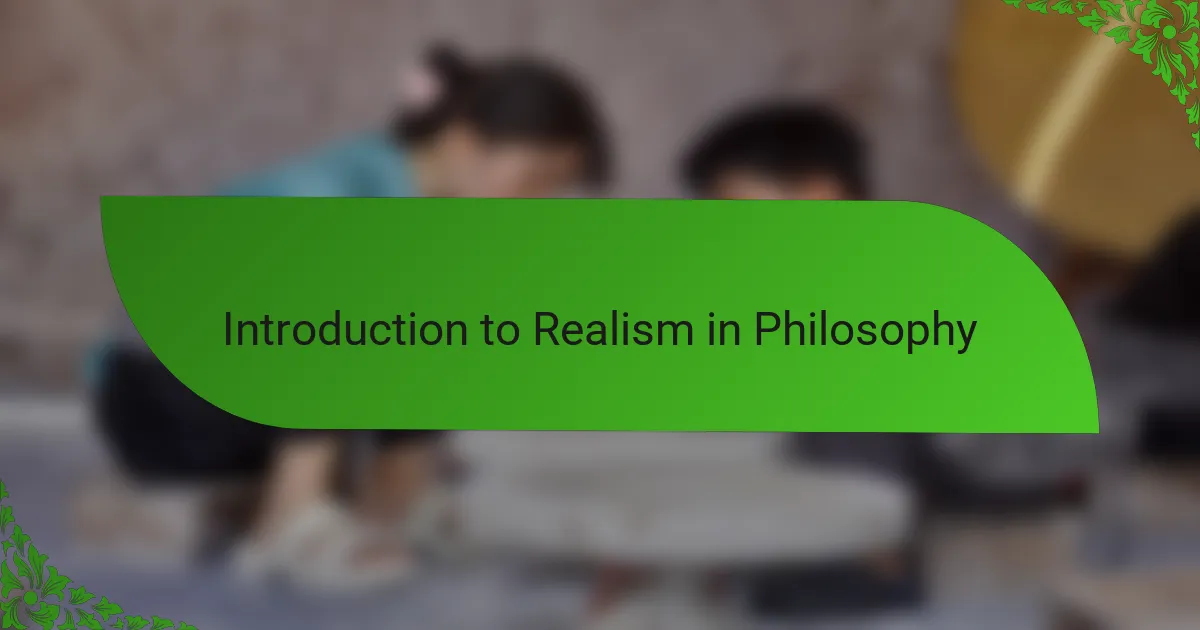
Introduction to Realism in Philosophy
When I first encountered realism in philosophy, I was struck by its insistence on an objective reality independent of our perceptions. It made me wonder: can we truly separate what is from what we think it is? This question felt both challenging and intriguing, sparking a curiosity that has guided much of my philosophical exploration.
Realism, as I understand it, challenges the comforting idea that reality bends to our beliefs or feelings. Instead, it demands that we confront the world as it exists, whether or not that fits our expectations. Have you ever felt that uneasy tension—knowing that your perspective might be only one version of the truth? That tension is where realism dwells, and I find it both humbling and grounding.
What fascinates me most is how realism shapes the way we seek knowledge. It pushes us to dig beyond appearances and strive for an understanding that holds up under scrutiny. This relentless pursuit resonates deeply with me, as it transforms philosophy from abstract musings into a dynamic engagement with the world’s fundamental nature.
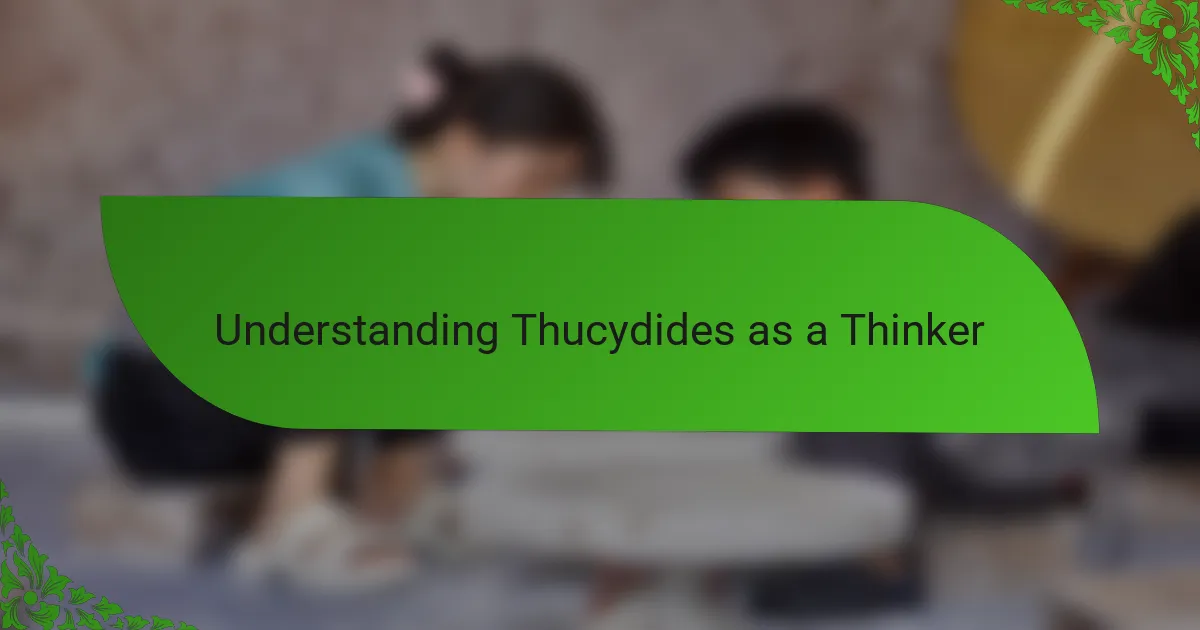
Understanding Thucydides as a Thinker
When I think of Thucydides as a thinker, what strikes me most is his sharp commitment to observing human nature without illusions. He didn’t just record events; he dug into the motives and power struggles shaping history. Have you noticed how his realism feels so raw, almost as if he’s inviting us to confront uncomfortable truths about ourselves?
What I find compelling is Thucydides’ clear-eyed assessment of power and conflict. He seems to argue that fear, honor, and self-interest drive human actions more than ideals or morality. Reflecting on that, I can’t help but question how often we fool ourselves into thinking otherwise. Isn’t that a sobering reminder about the world’s complexity?
Sometimes, reading Thucydides feels like a conversation with someone who’s seen the harsh realities firsthand and refuses to sugarcoat them. That honesty challenges me to be more critical and less idealistic when considering political or social issues. It’s like he’s saying, “Look, here’s the world as it really is—let’s not pretend.”
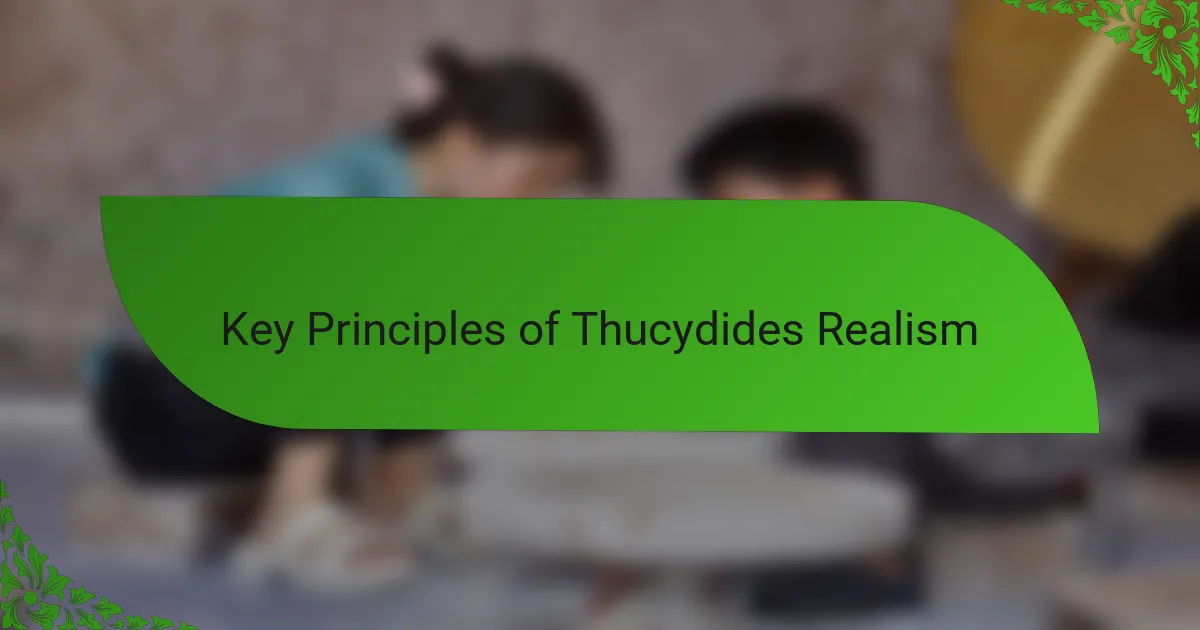
Key Principles of Thucydides Realism
What really stands out to me in Thucydides’ realism is the idea that power and self-interest are at the core of human behavior. It’s not just about lofty ideals or moral codes—it’s about survival and influence. Have you ever noticed how often people, even ourselves, justify actions by appealing to something nobler, while underneath, it’s really about gain or fear? That’s exactly where Thucydides cuts through the noise.
Another principle that resonates deeply is the role of fear and honor as driving forces in conflict. This isn’t some abstract theory for me; it’s a mirror reflecting real-world dynamics I’ve witnessed in both personal and political arenas. When fear dictates decisions, rationality takes a back seat. Isn’t it fascinating—and a bit unsettling—how much these primal motives shape events on such a large scale?
Finally, I appreciate Thucydides’ uncompromising commitment to empirical observation. He doesn’t let ideology cloud his narrative; instead, he records events as they unfold with brutal honesty. This approach challenges me to question my own biases and to seek truth, even when it’s uncomfortable. Have you ever found that the harshest truths often lead to the clearest understanding? That’s the power of his realism.
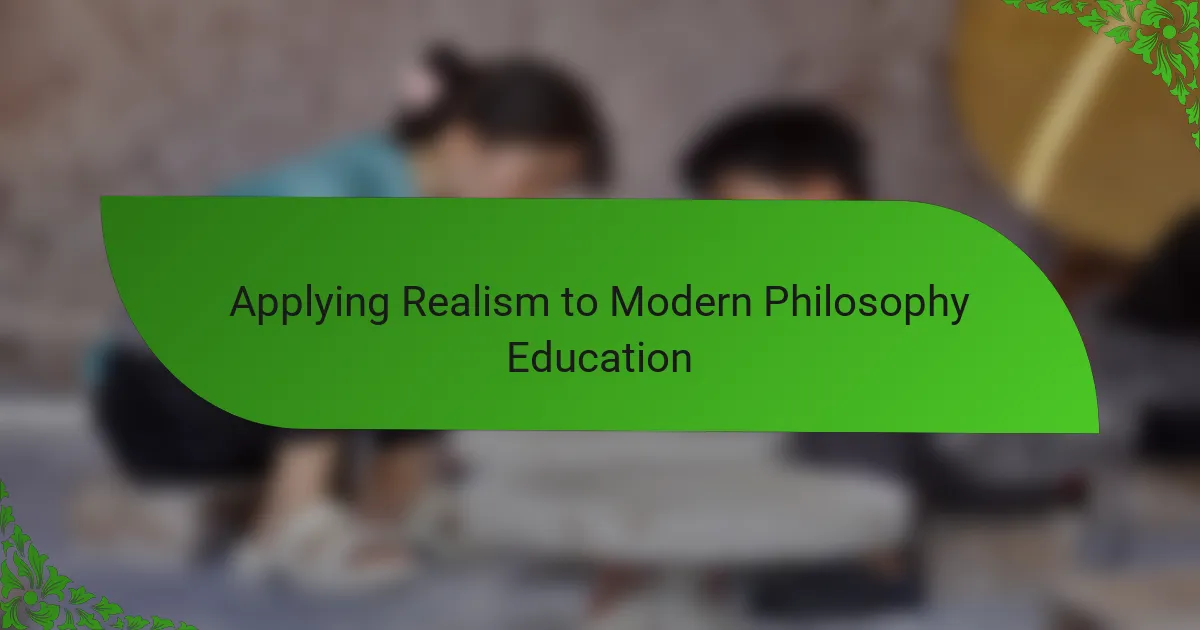
Applying Realism to Modern Philosophy Education
Applying Thucydides’ realism to modern philosophy education feels, to me, like a call to anchor discussions in the messy realities of human behavior rather than idealized theories. Have you ever noticed how classrooms sometimes drift into abstract ideals, forgetting the raw drivers of power, fear, and self-interest? Bringing Thucydides’ perspective into the dialogue helps students confront complexity head-on, making philosophy feel more immediate and relevant.
When I integrate this realist lens into teaching, I see students wrestling with the uncomfortable truth that humans often act not out of pure reason or morality, but from competing desires and fears. It’s a moment that shakes their initial assumptions and sparks deeper curiosity. Isn’t this challenge—questioning what we hope is true versus what actually is—what makes philosophical inquiry so vital?
Beyond content, applying realism encourages a kind of intellectual humility I find essential in education. It reminds me—and my students—that acknowledging uncomfortable realities is not defeat but a pathway to clearer thinking. How often do we cling to comforting explanations, only to realize that embracing brutal honesty leads to richer insights? This is the practical power of Thucydides’ realism in today’s classroom.
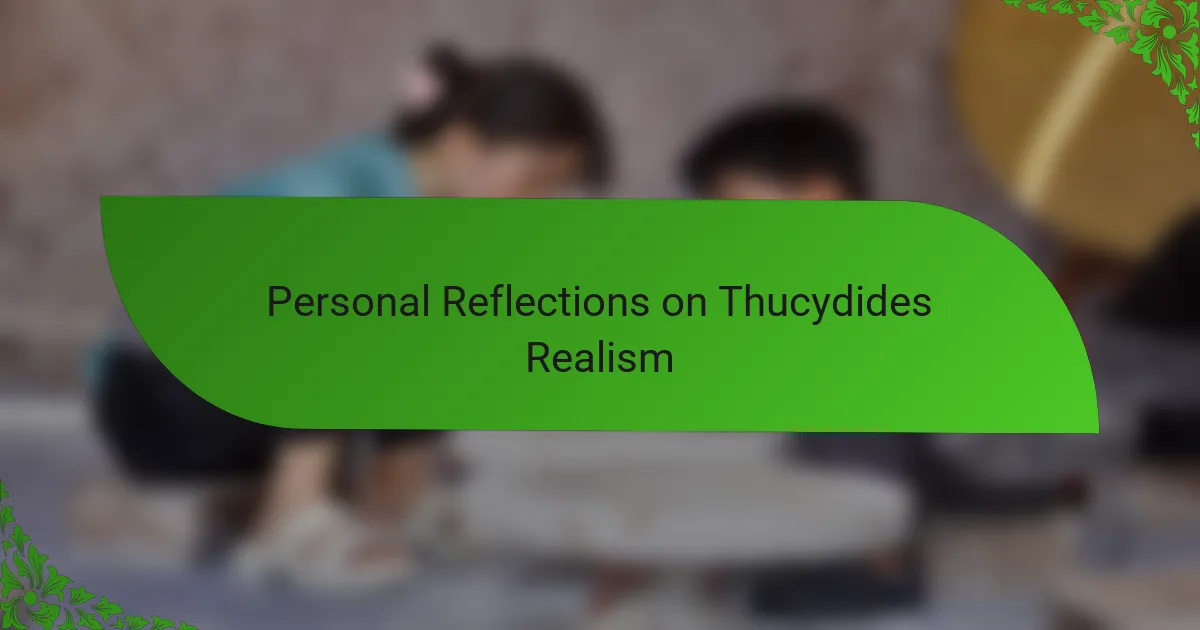
Personal Reflections on Thucydides Realism
Encountering Thucydides’ realism felt like looking into a mirror reflecting not just human nature, but my own biases. I remember reading his account of the Melian Dialogue and feeling a knot in my stomach—it was an unflinching reminder of how power dynamics overshadow ideals. Have you ever faced a moment where your idealism abruptly meets reality’s cold stare? That’s exactly the kind of awakening his realism provoked in me.
What stays with me is how Thucydides doesn’t ask us to accept cynicism, but rather to embrace a clearer, if harsher, understanding of motives. His focus on fear and self-interest made me reconsider countless historical events and even personal decisions I once thought purely principle-driven. Isn’t it strange how often our justifications crumble under scrutiny, revealing the less noble currents beneath?
Reflecting on Thucydides also challenges my tendency to hope for moral clarity in political struggles. His realism pushes me to sit with the discomfort of ambiguity and competing interests, rather than seek neat answers. I find this both frustrating and freeing—frustrating because it unsettles comfortable narratives, but freeing because it invites a more honest engagement with the complexities of human affairs.
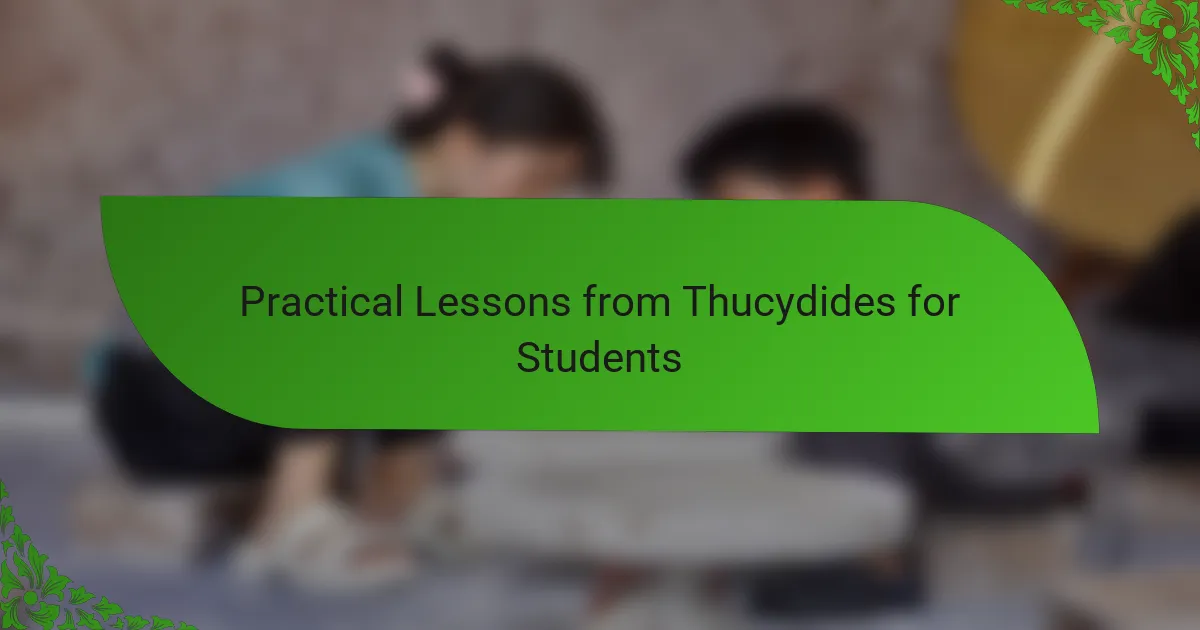
Practical Lessons from Thucydides for Students
One practical lesson I’ve learned from Thucydides is the importance of facing uncomfortable truths in my own studies. When I first approached his work, I felt a bit unsettled realizing how much fear and self-interest quietly influence decisions, even in daily life. Have you ever noticed how easy it is to overlook these motivations in favor of kinder explanations? Recognizing this has made me a more honest thinker.
Another takeaway is developing intellectual humility. Thucydides shows us that power dynamics and human nature aren’t simple or neat—they’re messy and often harsh. This perspective encouraged me to question my assumptions instead of clinging to comforting ideas. Can you recall a time when accepting a hard truth actually deepened your understanding rather than shattering it? For me, that’s been a game-changer.
Finally, Thucydides taught me that grappling with complexity isn’t a sign of defeat but a necessary step toward clarity. In my experience, students who embrace this challenge become more engaged and thoughtful, not less. How often do we shy away from complexity, wishing for clear-cut answers? His realism invites us to sit with ambiguity and grow from it, which I believe makes philosophy education truly valuable.